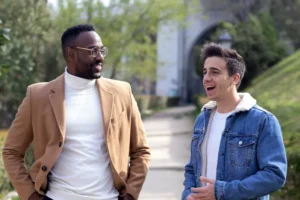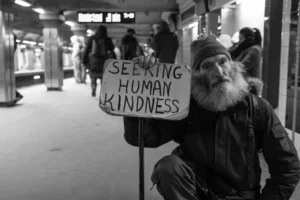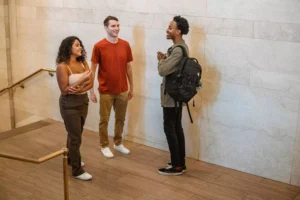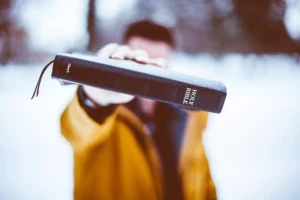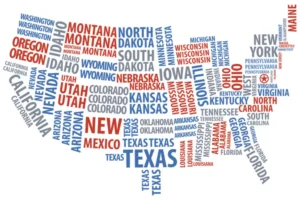On January 8, 1956, Ecuadorian warriors from the Waodani tribe speared to death the five missionaries who had tried to befriend them. The world held its breath as news outlets reported that the bodies of Nate Saint, Jim Elliot, Ed McCully, Roger Youderian and Pete Fleming had been found in a remote jungle river.
The Saint family has been connected with the Waodani tribe ever since. Just a few years after her brother’s murder, Nate Saint’s sister, Rachel, moved to Ecuador, living with the Waodani until her death from cancer in 1994. After her funeral, tribe members convinced Nate’s son Steve to move his family to Ecuador and live in the jungle with the Waodani, which they did for a year and a half.
Steve’s son Jaime had just graduated from high school. Jaime Saint is now the executive director at ITEC (Indigenous People’s Technology and Education Center), an organization founded by Steve in 1996. He lives with his wife and six daughters in Florida.
Your family’s story has been shared worldwide in magazines, books and on television, as well as in the 2006 movie “End of the Spear.” Many people have been blown away by the forgiveness your family showed toward the Waodani attackers. Your father even spoke internationally alongside Mincaye, one of the men who killed your grandfather, and wrote a tribute to Mincaye after his death last year. What has your relationship been with the Waodani, and what are your memories of Mincaye?
I have known the Waodani for as far back as I can remember. Growing up, we took multiple trips down to the jungles to be with Aunt Rachel and the Waodani. One of my favorite memories of Mincaye is when we were taking him back to the jungles after a speaking tour in 2005. My dad was in the copilot seat, I was in the next row and Mincaye was right behind me. It dawned on me, as we were flying out, that 50 years prior to that moment in time, my grandfather, Nate, was flying over those same jungles to try to find the Waodani who were now part of our family. In front of me was his son and behind me was the man who killed him. Only God can write a story like that.
In a nutshell, what does ITEC do? What sets it apart from other missions organizations?
ITEC was the Waodanis’ idea. They told my family to move down after Aunt Rachel died to teach them to do what foreigners knew how to do (things like medical care, dental care, aviation). ITEC develops tools and training systems by changing our tools for a developing world context, trains indigenous Christ followers to meet felt needs in their communities as a door opener to share the gospel, and equips others to do the same both domestically and abroad. This reduces dependency on foreigners and foreign missionaries, long- and short-term, and empowers native peoples to take ownership of their buildings, businesses and projects.
As a third-generation missionary, did you grow up assuming you would go into missions? How did you go about determining God’s specific leading in your life? What encouragement or advice would you give young adults seeking God’s will in their decisions?
When I was in my mid-20s, I told God that I was willing to go anywhere and do anything He wanted me to do except to work at ITEC. A few years later, I erased the line in the sand and said that I was willing to do anything, anywhere (even ITEC) as long as the Lord would show me enough so that I could be obedient. I asked Him to write His story with my life.
Ask God to use your life to tell His story and that you will do whatever He asks as long as He shows you enough so that you can be obedient to whatever is the next step. This does not mean we don’t plan, but we must write our plans in pencil, submitting them to the Lord, being willing to follow Him rather than what we think is best.
What role can young adults fill in missions? If someone does not believe they are called into full-time missions, what would you say to them about ways they could still be involved?
The Great Commission is not a call to some Christ followers, it is a call to all Christ followers. John Piper said that all Christians have one of three roles to play in missions: 1) Go; 2) Send; 3) Disobey. God can use single adults, married adults and families who are willing to be used to reach the world. It might mean to make a lot of money while living a modest lifestyle to significantly support missionaries and missions organizations. It might be as a businessperson who never leaves their country or a doctor who works in their home country but uses their skills to train indigenous Christ followers in rural areas to meet needs in their communities 1-2 weeks per year.
Your family’s story is well-known around the world. What is it like for you to be a part of that legacy? How is your family different — how are you different — because of something that happened decades before you were even born?
Many people talk about the legacy I have. Some people ask what it is like to live in the shadow of my grandfather and my dad. I can’t be Nate Saint or Steve Saint, and God hasn’t asked me to be them. But they can’t be Jaime Saint, either. God wants to write my story His way, and I will leave the impact and results up to Him. He is the Author and the Finisher of our faith.
My family is no different than any other. We are normal people. God chose to use our family to write a story that has been used to challenge people to give their lives to the Lord in service. We don’t get caught up in the hype or succumb to those who would want to put us on a pedestal. We want our lives to point people to Christ, and we will trust Him to use us as He sees fit.
Copyright 2021 Lauren Dunn. All rights reserved.





